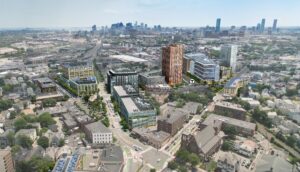
A rendering shows Union Square master developer US2’s redevelopment plan for the neighborhood. The parcels which The Hamilton Co. proposed to build on are at the center, closest to the viewer. Image courtesy of US2
Maybe Greater Boston’s best days are still to come.
But if 50 years or a century from now, historians look back at how the region’s life sciences and tech boom went bust after showing so much promise, they may very well point the finger at the Massachusetts phenomenon of local control gone wild.
Confronted with soaring demand for new labs, homes and apartments, cities and towns across the Boston area were simply unable to get out of their own way, tying up new development projects with endless red tape and reviews, those future historians would likely conclude.
Fast-growing life science and tech companies eventually decamped for Texas, Florida and other sunnier climes, drawn by lower housing costs and more growth-friendly economies, they’ll note.
To see a current example of local bureaucracy run amok, one need look no further than Somerville, where city officials are giving the run-around to a promising proposal for a new lab building along with much-wanted park and civic space.
Two Big Problems
The developer, family-owned commercial and residential firm The Hamilton Co., wants to build a 4-story research, lab and office building in Somerville’s Union Square that would include a 13,000-square-foot public park and new retail and restaurant space along Somerville Avenue.
Another 6,500 square feet of space facing the new park would be reserved for civic space, such as a new city library branch.
Having lined up some solid neighborhood support, Hamilton formally submitted its development plans to Somerville officials this spring, with hopes of winning approval for its plans over the next 12 to 18 months.
In a strange turn of events, though, the developer’s hopes for a predictable review process and a construction launch in the not-too-distant future have been dashed.
At a meeting with the Somerville Planning Board in June, Jameson Brown, the company’s chair and CEO, was informed that he would also have to win not just the city’s approval, but also a green light from Union Square Station Assoc., the corporate master developer appointed a decade ago to oversee the redevelopment of the area.
Let’s just say there may be a couple of small problems with this.
For starters, the master developer, more often known as US2, does not own the Union Square site in question here, a stretch of buildings along Somervile Avenue called the Union Square South Block.
The Hamilton Co. is the owner of the Union Square block, free and clear.
Second, deputizing a private sector entity like US2, a Chicago-based partnership between Magellan Development and Mesirow Financial, to take on what is essentially a government planning role raises all sorts of potential conflicts of interest.
One need look no further than the development of Boston’s Seaport, which saw a number of clashes over years between different developers and property owners with differing visions, to understand some of the unwieldly dynamics at play here.
Needless to say, it’s not a view that Greg Karczewski, president of US2, subscribes to.
In appointing US2 to be the master developer of what is now 20 acres around Union Square – including the site the Hamilton Co. want to build on – the city was trying to avoid “a piecemeal development of the various parcels,” Karczewski said in a written statement provided by a US2 spokesperson.
In fact, under its agreement with Somerville, US2 is obligated to buy the Hamilton property and develop it in accordance to the master plan it, residents and city officials hammered out for the area, which calls for a mix of “office buildings, retail, arts spaces, open space and underground parking,” he added.
“We have been clear throughout our engagements with them that we intend to develop the [Hamilton] property in accordance with our agreements,” Karczewski said. “We also made an offer to purchase the property which Hamilton did not accept.”
Claim: US2 Slow-Walked Talks
Still, it’s not all that clear that US2 covered itself in glory when it comes to the redevelopment of Union Square.
A decade in, the project is just now delivering on its first phase, with lab space for as many as 500 workers and 450 apartments.
But where some may see sluggish progress, US2’s Karczewski sees a project that’s not just on time, but even ahead of schedule.
“Since our designation, US2 has been working every day from our office in Union Square to advance the City and community goals for the neighborhood,” he said. “The progress has been significant.”

Scott Van Voorhis
Given its stated goal of buying Hamilton’s site out from under it, US2 has not exactly rushed to capitalize on the firm’s development proposal, with Jameson, Hamilton’s chief, arguing discussions with the master developer have led nowhere.
In a letter to Somerville’s City Council, Jameson warned of the perils of giving what amounts to another developer – in this case, US2 – veto power over other proposed projects in Union Square.
Such a move, he wrote, would wind up “reducing the City Council, the Planning Board and the [Inspectional Services Department] to mere tools of a single developer and the Redevelopment Authority at the expense of the expense of the community and other landowners.”
Greater Boston needs more lab space and more housing. The last thing it needs is another layer of bureaucracy standing in the way of decent projects, and a corporate, self-interested one at that.
Editor’s Note: This column has been updated with comment from US2, which arrived after Banker & Tradesman’s print deadline.
Scott Van Voorhis is Banker & Tradesman’s columnist; opinions expressed are his own. He may be reached at sbvanvoorhis@hotmail.com.




